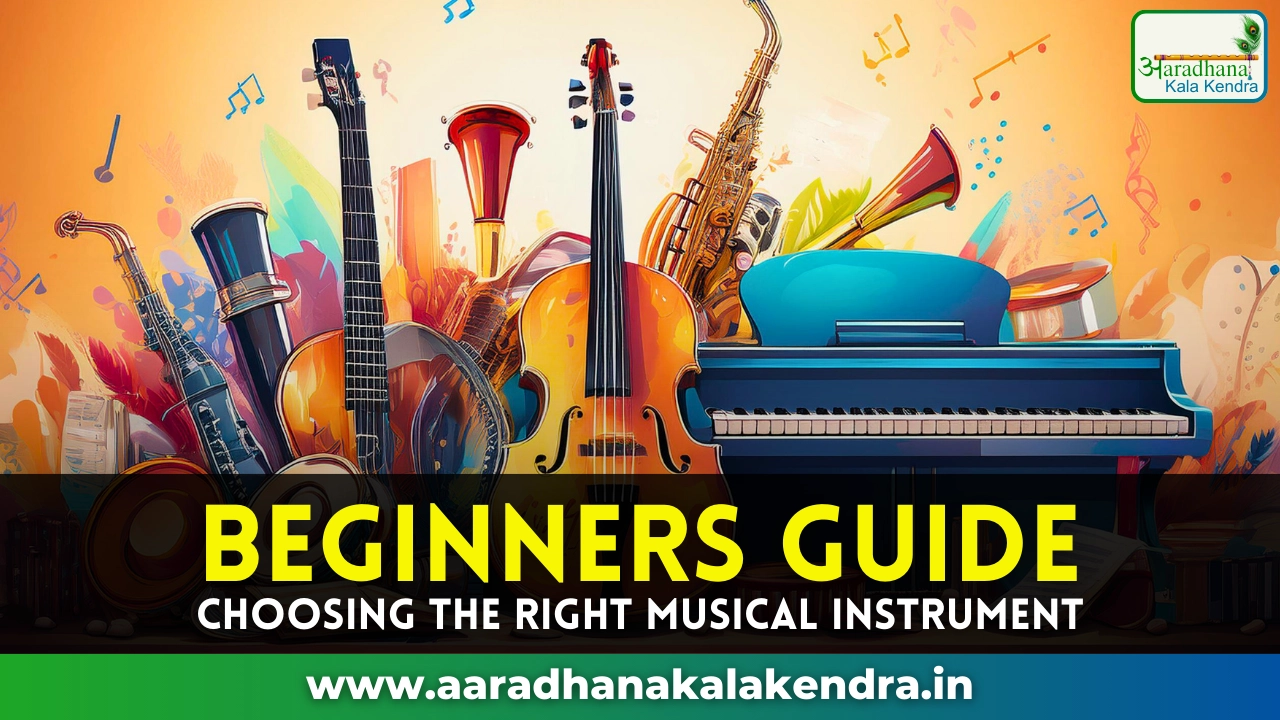Musical Instrument Classes: Choosing the Right Instrument For You
Choosing the right musical instrument is an exciting yet crucial first step in your musical journey. With an overwhelming array of options—from the soft melodies of a flute to the resonating beats of a drum set—how do you determine which instrument best suits you? Whether you’re looking for Musical Instrument classes near me, considering Musical Instrument classes for adults, or searching for the best way to learn musical instruments online or for your child to learn musical instruments for kids, the choice of instrument can significantly influence your growth, enjoyment, and satisfaction.
This guide will help you make an informed decision, whether you are an adult seeking a new hobby or a parent helping your child embark on their first musical adventure. Let’s delve into the essential factors to consider to ensure you choose the right musical instrument that resonates with your personality, aspirations, and lifestyle.
Understanding Your Goals and Preferences
Before diving into the vast ocean for choosing the right musical instruments, start by understanding your motivations and preferences. Are you learning an instrument for personal enjoyment, to join a group, to pursue a professional career, or for therapeutic reasons? Each of these goals can point you towards different instruments.
- Personal Enjoyment: If you aim to play for fun, an instrument like the keyboard or harmonium can be an excellent choice. They are relatively easy to learn and provide instant gratification.
- Social Engagement: Planning to join a band or an ensemble? Instruments like the guitar or drums are well-suited for group performances and can quickly integrate you into a musical community.
- Professional Aspirations: Serious about building a career in music? Opt for instruments like the violin or tabla, which are not only in demand but also offer rich professional opportunities.
- Therapeutic Purposes: Instruments like the flute or piano are often used in music therapy due to their calming and soothing qualities. They can help in stress relief and emotional expression.
By aligning your goals with the choice of instrument, you lay a strong foundation for a fulfilling musical journey. For those in New Delhi, consider enrolling in the Best Music Classes in New Delhi or Top Music Classes Institute in Delhi like Aaradhana Kala Kendra.
Consider Your Physical Compatibility
Not all instruments are created equal when it comes to physical demands. Depending on your age, size, strength, and mobility, certain instruments may be more suitable than others.
- Young Children: For young beginners, small-sized instruments like the ukulele or flute are more manageable and less intimidating. Their size makes them easier to handle and play.
- Adults with Limited Mobility: Instruments like the keyboard or harmonium require minimal physical exertion and are great for those with limited mobility.
- Strong Hands and Dexterity: If you possess good hand strength and finger dexterity, string instruments such as the guitar or violin might be ideal. These instruments demand precise finger movements and control.
Taking your physical attributes into account can ensure a comfortable and enjoyable playing experience, reducing the risk of strain or injury. Whether looking to learn musical instruments for kids or exploring Musical Instrument classes for adults, this consideration is key.
Assess the Learning Curve
The ease or difficulty of learning an instrument can significantly impact your motivation and progress. Some instruments are inherently easier for beginners, while others may require more time and dedication to master.
- Easy to Learn: Instruments like the keyboard and harmonium are relatively easy to learn. They offer straightforward mechanisms to produce sound and require minimal training to play basic melodies.
- Intermediate Difficulty: Instruments like the flute or guitar pose a moderate challenge. They demand practice to master techniques like finger placements and breath control.
- Advanced Level: Instruments like the tabla or violin can be more complex, requiring a longer commitment to practice. These are often pursued by those with a serious interest in classical music or who are prepared for a steeper learning curve.
Choosing an instrument with a suitable learning curve can prevent frustration and help maintain enthusiasm, especially for beginners.
Evaluate Your Budget
Before Choosing the Right Musical instruments, they come in a broad range of prices, and your budget is a practical consideration that can influence your choice. From affordable entry-level options to high-end professional instruments, there is something for every pocket.
- Affordable Options: Instruments like flutes, harmoniums, and ukuleles are typically less expensive and make great choices for beginners who are just starting out and don’t want to make a significant financial investment.
- Mid-Range Instruments: Guitars and keyboards offer a range of prices, from budget-friendly beginner models to high-end professional versions, allowing flexibility depending on your commitment and budget.
- High-End Instruments: Violins, sitars, and drum sets can be more expensive, especially when considering quality, craftsmanship, and brand. These are ideal for serious musicians who are willing to invest in their craft.
Setting a budget early on helps narrow down your options and ensures you make a choice that’s financially comfortable.
Seek Guidance from Experts
If you’re still undecided, consider seeking advice from experienced musicians or instructors. At Aaradhana Kala kendra, we offer free consultations to help you find the right instrument that aligns with your unique qualities, interests, and aspirations. Our seasoned teachers can provide personalized recommendations based on your goals, physical attributes, and budget.
Take Trial Lessons
One of the best ways to ensure you’ve choosing the right musical instrument is to take a few trial lessons. This hands-on approach lets you experience the instrument directly, gauge your comfort level, and understand the basics of playing it. At Aaradhana Kala kendra, we offer trial classes for most of our courses, providing you the chance to make an informed decision.
FAQs
- How do I choose the right musical instrument if I have no prior experience?
Begin by considering your goals, preferences, and physical compatibility. Evaluate the instrument’s learning curve, budget, and seek expert advice if necessary. Trying trial lessons can also help you find the best fit. - What is the easiest musical instrument to learn for beginners?
The keyboard and harmonium are often considered the easiest due to their straightforward mechanics and ability to produce a pleasing sound with minimal effort. - Can adults learn to play a musical instrument?
Absolutely! Adults can learn any instrument with dedication and practice. Choosing an instrument that matches your physical compatibility and interest is key. - How important is the budget when choosing an instrument?
Budget is a significant factor, as it can determine the range of instruments available to you. Set a budget beforehand to narrow down your options. - What if I start learning an instrument and then lose interest?
It’s common to lose interest if the initial choice does not match your preferences. Trial lessons can help prevent this by allowing you to explore different instruments before committing. - Why are some instruments considered more difficult to learn than others?
The difficulty level of an instrument often depends on the technical skills required, such as finger positioning, breath control, or rhythm coordination. Instruments like the tabla or violin require more intensive practice to master.
Conclusion
Choosing the right musical instrument is an exhilarating part of your musical adventure. By understanding your goals, assessing your physical compatibility, considering the learning curve, evaluating your budget, and seeking expert guidance, you can make a choice that aligns with your aspirations and lifestyle. At Aaradhana Kala kendra, we are here to help you find your unique musical path. So take that first step, explore your options, and start creating beautiful music today!



